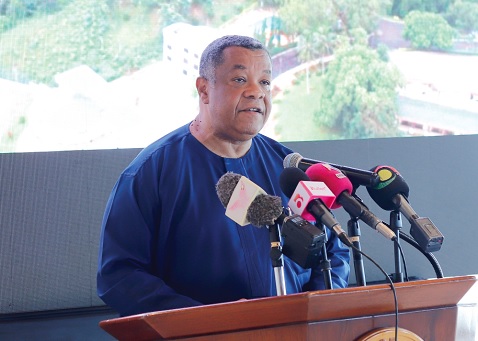
Fix weaknesses in regulatory system for easy credit access - Goosie Tanoh to banking sector
The Presidential Adviser on 24-Hour Economy, Goosie Tanoh, has stressed the need to address weaknesses in the banking and regulatory systems to ease credit to productive enterprises.
He said addressing such challenges would help ensure the successful implementation of the 24-Hour Economy.
Mr Tanoh said while the programme was designed as a private-sector-led transformation agenda, its success depended on accessible credit and effective alignment between banks, regulators and entrepreneurs.
He was speaking at a banking sector roundtable organised by the 24-Hour Economy and Accelerated Development Programme (24H+) Secretariat in Accra.
The event which brought together players within the financial ecosystem together was on the theme: Financing Ghana’s 24-Hour: The role of banks in the transformational journey.”
Private sector drive
Mr Tanoh explained that the 24-Hour Economy Policy was built on the backbone of micro, small and medium enterprises (MSMEs), cooperatives, and both local and foreign companies.

“It is about rethinking and re-engineering critical value chains, fixing or replacing weak links, and building virtuous cycles of entrepreneurship, investment, production, distribution, profit and reinvestment,” he added.
Mr Tanoh said entrepreneurs in the country faced some of the toughest banking conditions in Africa, including high interest rates, strict collateral requirements and short-term loan structures.
“Any entrepreneur will tell you that availability, costs, term structure and collateral conditions of Ghana’s banking industry rank among the highest constraints to business development. We must fix this,” he said.
These were compounded by long-standing weaknesses in financial regulation and public finance management.
Mr Tanoh said over the years, governments had relied heavily on banks to finance budget deficits instead of channelling funds into productive sectors.
At the same time, regulatory interventions had been piecemeal rather than systemic.
“The banking industry too has its problems, rooted not just in the riskiness of our enterprises, but also in the accretion over many years of disjointed rather than systemic fixes of bureaucratic regulatory systems.
“And the structural incentives that desperate governments have offered to increase banking sector support for the national budget. We must fix this also,” he added.
Economy
Mr Tanoh further said that the country could not depend on outsiders to build its economy.
“Sometimes we in Ghana believe that other people will come and fix our country and grow our country.
That, unfortunately, is a dream that will never be realised. We have to fix it. And to fix it, finance is at the centre,” he said.
Mr Tanoh called for concerted and simultaneous reforms by banks, regulators and the government, adding that the 24-Hour Secretariat had developed a package of financing solutions that could both strengthen the banking system and profitably support entrepreneurship.
“We must take ambitious measures—concrete, synergistic and simultaneous steps; together with full awareness of how they impact each other. Only then can we open up space for the productive economy, which is the foundation of national growth,” he said.
BoG support
The Governor of the Bank of Ghana (BoG), Dr Johnson Asiama, in a speech read on his behalf by the Director of the Banking Supervision Department of BoG, Ismail Adam, underscored the central bank’s readiness to play a pivotal role in the government’s flagship 24-Hour Economy initiative.
He described the 24-Hour Economy Policy as a commendable initiative with the potential to transform the country’s development trajectory.
Dr Asiama said the policy could drive capital investment, enhance productivity, create jobs and raise household incomes, while ensuring maximum utilisation of both private assets and public infrastructure that often remained underused during off-peak hours.
He, however, said that the success of the policy would hinge on a strong banking sector, robust regulatory supervision and improved access to affordable credit for businesses.
“No nation has developed without appreciable growth in the financial sector. The financial sector and the real economy are intertwined,” Dr Asiama added.
